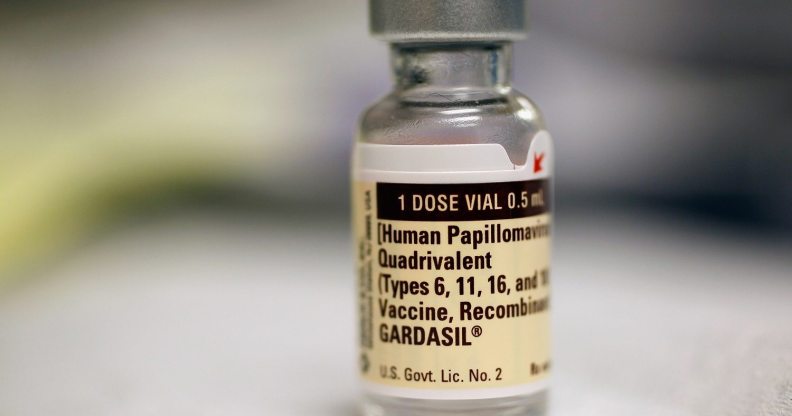HPV vaccine will be rolled out to boys in England, government confirms

A bottle of the Human Papillomavirus vaccination (Joe Raedle/Getty)
The UK government has confirmed that HPV vaccines will be extended to teenage boys in England – after recommendations from a key advisory panel.
A routine vaccination programme began in 2008 among school-age girls in the UK to tackle the human papilloma virus, which spreads through genital or oral contact and can cause a number of cancers.
Only girls were vaccinated on the grounds that men who only have sex with women would be protected from transmission through ‘herd immunity’.

(Getty)
However, the ‘herd immunity’ plan left gay men vulnerable. As unvaccinated men have sex with other unvaccinated men, they are effectively left without any protection from HPV- allowing it to spread through the gay community.
The Joint Committee on Vaccination and Immunisation last week published a report recommending that the vaccine is routinely extended to school-age boys as well as girls.
The JCVI found that routinely administering the vaccine to teenage boys as well as girls would significantly reduce the number of HPV-related cancers deaths and be cost-effective.
The UK government today confirmed that it would implement the change in England, following similar decisions from the Welsh and Scottish governments. No decision has been made in Northern Ireland, which currently has no devolved government due to a political crisis.

A doctor gives an HPV vaccination to a 13-year-old girl (Joe Raedle/Getty)
UK government Public Health Minister Steve Brine said: “The HPV vaccine for girls is already expected to save hundreds of lives every year and I am delighted that we will now be protecting even more people from this devastating disease by extending the vaccines to boys.
“Any vaccination programme must be firmly grounded in evidence to ensure that we can get the best outcomes for patients, but as a father to a son, I understand the relief that this will bring to parents.
“We are committed to leading a world-class vaccination programme and achieving some of the best cancer outcomes in the world – I am confident these measures today will bring us one step further to achieving this goal.”
Dr Mary Ramsay, Head of Immunisations at Public Health England, said: “This extended programme offers us the opportunity to make HPV related diseases a thing of the past and build on the success of the girls’ programme, which has already reduced the prevalence of HPV 16 and 18, the main cancer-causing types, by over 80%.
“We can now be even more confident that we will reduce cervical and other cancers in both men and women in the future.”
Welsh Health Secretary Vaughan Gething said : “I’ve decided that the HPV vaccination programme will be extended to include adolescent boys in Wales. This follows advice from the Joint Committee on Vaccination and Immunisation.”
Scotland’s Public Health Minister Joe FitzPatrick said: “I am pleased to announce that the Scottish Government will implement a HPV vaccination programme for adolescent boys in Scotland.
“We know from the recommendations made by the Joint Committee on Vaccination and Immunisation that this will help reduce diagnoses of HPV related cancers and save lives in years to come.
“Work to develop the programme will now begin, in conjunction with Health Protection Scotland and NHS Scotland, to be rolled out as soon as is practicable.”

UK Health Secretary Matt Hancock (Dan Kitwood/Getty)
Campaigners have celebrated the decision to extend the vaccine.
Liberal Democrat Welsh Assembly Member Kirsty Williams said: “The Welsh Liberal Democrats have been calling for this policy change, in line with mounting scientific evidence, for a while.
“We welcome with delight the decision by the Health and Social Care Secretary to extend the HPV (human papilloma virus) jab to teenage boys after a recommendation was made by the Joint Committee on Vaccination and Immunisation.
“This ensures gender equity for boys, especially young gay, bisexual and transgender boys, whose health was unfairly endangered by the previous policy.”
Dr Jane Fenton-May of the Royal College of GPs said: “This is a positive step. The HPV vaccine protects against a range of conditions and cancers, regardless of a patient’s gender. It’s a simple injection and it will benefit patients.”

